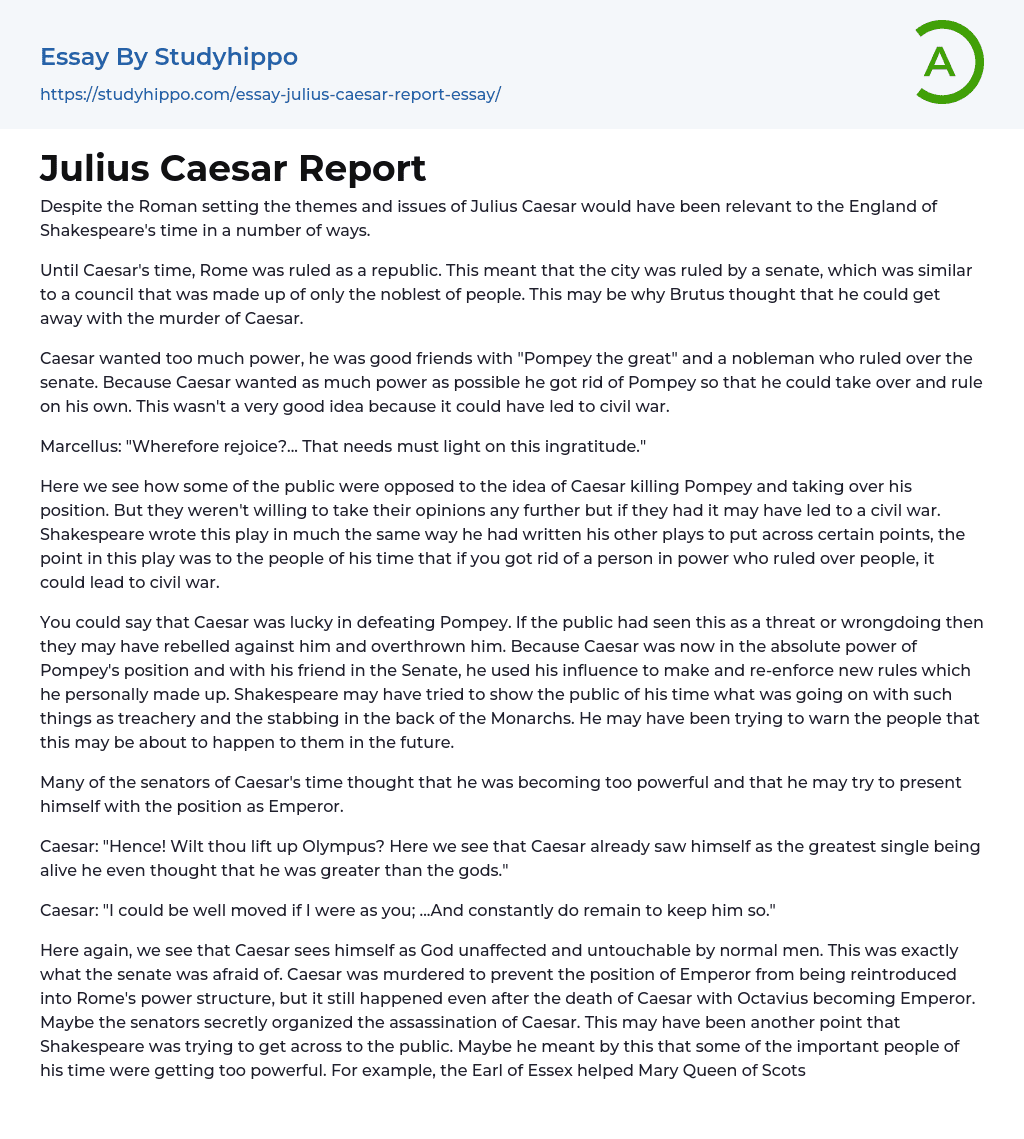The themes and issues of Julius Caesar would have been relevant to Shakespeare's England in various ways, despite its Roman setting. Rome used to be governed as a republic before Caesar's era.
The city was governed by a senate, resembling a council composed solely of the most noble individuals. This is possibly why Brutus believed he could successfully assassinate Caesar. Caesar, who desired extensive power, maintained a close friendship with "Pompey the great," a nobleman who oversaw the senate. In pursuit of maximum authority, Caesar eliminated Pompey in order to assume sole control. However, this decision was unwise as it could have instigated a civil war.
Marcellus expresses doubt and asks why anyone would rejoice in the situation where Caesar kills Pompey and takes over his position. This indicates that there were individuals in the
...public who opposed Caesar's actions. However, these individuals did not take their opinions any further, potentially to avoid a civil war. Shakespeare's purpose in writing this play, like his other works, was to convey certain points. One point in this play was to warn the people of his time that removing a ruler in power could result in a civil war. It could be argued that Caesar was fortunate in successfully defeating Pompey.
If the public perceived this as a threat or misconduct, they might have revolted against him and ousted him from power. As Caesar now held absolute authority in Pompey's place and had a friend in the Senate, he leveraged his influence to establish and enforce his own arbitrary rules. Shakespeare possibly aimed to depict the contemporary audience the events involving deception and betrayal of monarchs. His intention might have bee
to caution the people that they could potentially face a similar fate in the future.
During Caesar's time, many senators were concerned about his growing power and feared that he would attempt to declare himself Emperor. Caesar himself displayed a sense of superiority, even believing that he surpassed the gods. He saw himself as untouchable and unaffected by ordinary individuals. This was precisely what worried the senate. They orchestrated Caesar's murder in an attempt to prevent the reintroduction of the Emperor role in Rome's power structure. However, Octavius eventually became Emperor, suggesting that perhaps the senators secretly orchestrated Caesar's assassination.
Shakespeare may have intended to convey another point to the public, possibly suggesting that certain influential figures in his era were becoming excessively powerful. One such example is the Earl of Essex, who aided Mary Queen of Scots in her attempt to overthrow Queen Elizabeth the first. It is plausible that the play aimed to caution individuals about the potential dangers presented by those who were willing to challenge the ruler chosen by divine authority.
In real life, Julius Caesar was a remarkable ruler who established the expansive Roman Empire, exerting its dominion for centuries. He exhibited exceptional leadership qualities in times of both conflict and harmony. Nonetheless, in the play, his character is depicted as one of vanity, foolishness, weakness, and cowardice. Casca recounts an incident in which Caesar collapsed in the marketplace, frothing at the mouth and rendered speechless. This episode exemplifies Shakespeare's portrayal of Caesar as a feeble and fearful individual.
Despite lacking many, if any, qualities of the real Caesar, Shakespeare had a valid motive for depicting Caesar in such a manner. The purpose was
to present Brutus in a favorable light and elicit sympathy from the audience of Shakespeare's era towards Brutus and his perspective. By shaping Caesar's character in this way, Shakespeare subtly implies that Caesar could potentially be malevolent and detrimental to Rome, thereby justifying Brutus' decision to assassinate him.
Despite the negative portrayal of the ruler, the chaos that follows his assassination is even worse than before. Shakespeare's aim was to communicate the idea of Pandora's box to audiences. When deceit is unleashed, it brings forth death and chaos in various forms. Once opened, this box cannot be closed until all evil is eradicated or all involved are eliminated, similar to how Octavius and Antony pursued and defeated the conspirators relentlessly. However, a portion of the chaos stemmed from the deaths commanded by Antony and Octavius.
3 plebeian: "Your name, sir truly."
Cinna the poet: "Truly, my name is Cinna."
1 plebeian: "Tear him to pieces, he's a conspirator."
Cinna the poet: "I am Cinna the poet, I am Cinna the poet."
4 plebeian: "Tear him for his bad verses, tear him for his bad verses."
Cinna the poet: "I am not Cinna the conspirator."
4 plebeian: "It is no matter, his name's Cinna. Pluck but his name out of his heart and turn him going."
This passage illustrates how Antony and Octavius's ordered deaths of the conspirators have resulted in chaos caused by the public (plebeians). Their actions demonstrate a lack of control and inflict suffering as directed by Antony and Octavius. This situation can be seen as relevant to Shakespeare's England where betrayal and treachery were feared by monarchs, similar to Caesar after meeting with the soothe sawyer.
I have a strong belief
that history has a tendency to repeat itself.




